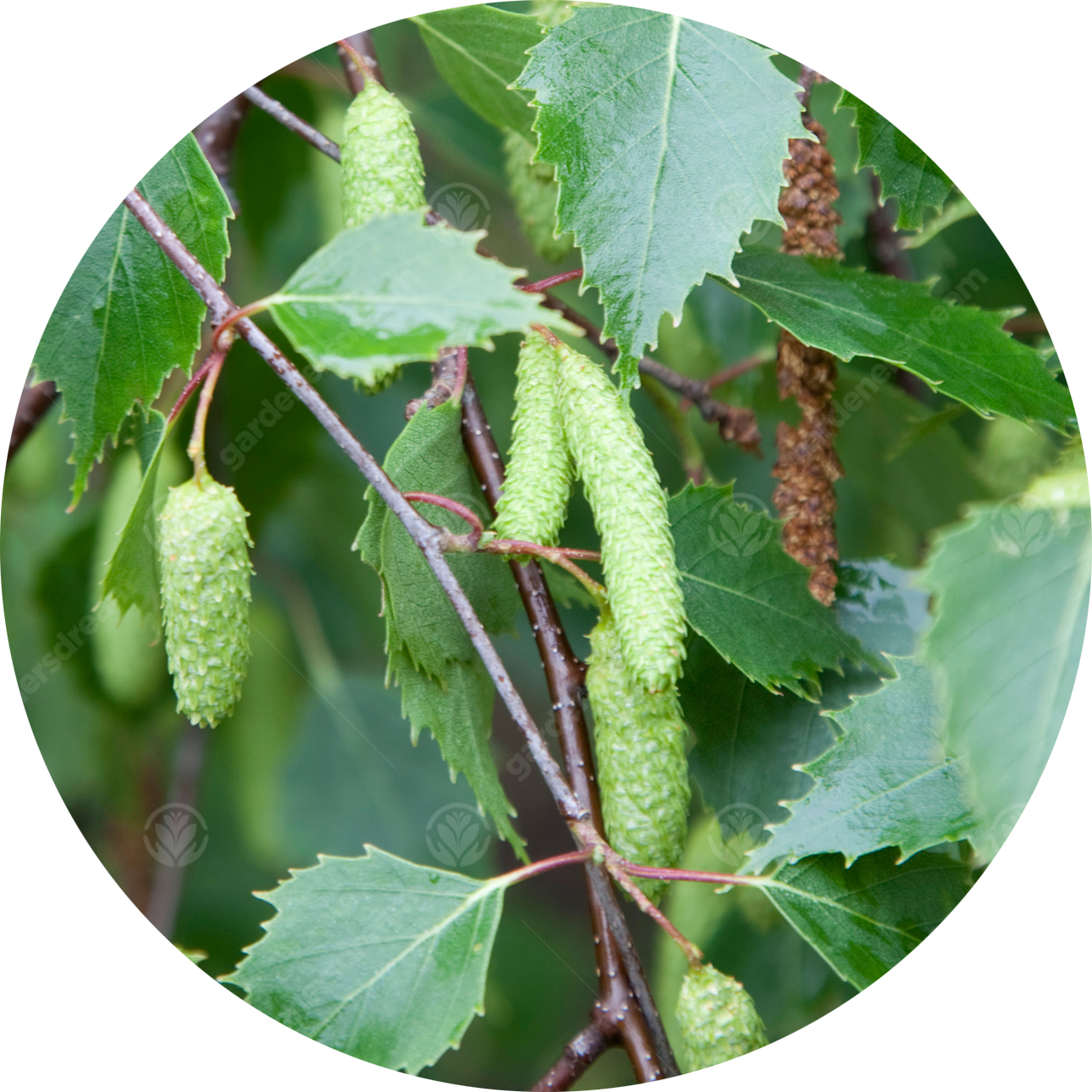(Betula pendula)
The name of this beautiful tree comes from the Sanskrit bhurga, meaning “a tree whose bark can be written on”. From bhurga, the word has evolved to Celtic betu, in English to birch, in Russian to bereza and in Serbian to breza. Pliny wrote that the Latin name betula comes from the Gauls (Celts) who collected tar from birch bark. Birch tar is still produced and sold today as an analgesic and stimulant, and is also used for the production of a special type of beer.
Birch, or Betula pendula – which is its scientific name – was the first tree to grow after the Ice Age, and the same scenario is repeated every spring when birch trees are the first to come into leaf. Birch wood is flexible, but also durable, so everything has been made of it for centuries, from canoes to baskets to huts. American Indians believed that lightning could not strike the birch and would therefore seek refuge under it on stormy nights.
It is logical that our ancestors recognised the power and symbolism of this tree and transferred it to mythology: birch twigs have long been used to make brooms to which magical properties have been attributed; this lives on today in fairy tales about witches flying on brooms and has even been transferred to modern literature.
Birch is part of traditional rituals around the world. In Serbia, when wedding guests leave the house for the church, they jump over a broom made of birch, something that will “cleanse” all evil and spells. It is believed that this custom originated from the Celts who used to live in the Balkans and mixed with the new Slav settlers. For the Celts, the broom represented a perfect balance of higher powers, because in their belief system it contained male and female energy. Male energy is symbolised by a phallus-shaped handle and female energy by a part with intertwined twigs. Even today it is also used in wedding ceremonies in Scotland.
Russians place birch twigs above their front door to keep evil forces out. England’s Victorians would whip children with birch twigs in order to expel evil forces from them. Cradles used to be made of birch wood to protect newborns, and in the Scottish Highlands cows would be chased with birch sticks to give birth to healthy calves. All over the world, birch is a symbol of renewal and purification. And that is not by accident. Modern phytopharmacy has proven that birch has a great power to purify the body.
There are many subspecies of birch, and the two most familiar to us are the silver (ordinary) birch and the flowering (northern) birch. Both have medicinal properties as their leaves, buds, bark and juice can be used for medical purposes. Today we know that birch leaf contains flavonoids, tannins, saponins, phenyl carboxylic acids, triterpene alcohols and vitamin C. What does all this mean? First of all, birch is a strong urinary antiseptic and diuretic.
The European Medicines Agency says that preparations based on birch extract are used to treat disorders of the urinary tract. However, extensive studies show that the range of its medicinal properties is much wider. Believe it or not, this noble tree has proven immunomodulatory, anti-inflammatory, antirheumatic, antioxidant, antimicrobial, antiviral, dermatological, antidiabetic, gastro-protective, hepatoprotective and anticancer properties.
EXTERMINATOR OF FREE RADICALS
Studies have shown that birch bark has the ability to fight free radicals due to a high level of phenol in its composition. In this way, it protects the body from oxidative stress and helps it fight infections and inflammation. In addition to phenols, birch bark is rich in triterpenes, whose role in the treatment of cancer and HIV is only slowly being discovered by science. Pentacyclic triterpenes are thought to act in synergy with other substances present in birch bark, including betulinic acid; unlike conventional anti-tumour therapy, they act much more selectively on cancer cells, with lower systemic toxicity. Birch’s antioxidant properties have also found application in the food industry, as extracts from it can be safely used as a natural additive to meat products to prevent changes in their natural colouring.
URINARY TRACT PROTECTOR
Birch’s strongest healing properties can been seen in its effect on the urinary tract. This plant helps us with:
- bacterial infections of the urinary tract
- Escherichia coli
- stones and sand in kidneys and bladder
- kidney problems
- water retention problems
- urinary bladder inflammation – cystitis
- prostate inflammation
- urine problems
The diuretic effect of birch was confirmed a long time ago, and today it is used as a therapy for inflammation of the urinary tract and kidney stones. Studies have shown that birch extract has the ability to reduce the motility of the most persistent bacterium, Escherichia coli. By increasing diuresis and inhibiting bacteria, birch successfully treats bacterial infections of the urinary tract.
Birch stimulates the elimination of fluids thanks to resins and flavonoids. In addition to having an effect on bladder, urinary tract, kidneys and prostate, this effect is extremely important for people who suffer from rheumatism and gout. Gout is known to occur due to the deposition of monosodium urea crystals and uric acid in the joints, which causes severe pain. Birch improves the elimination of these harmful crystals and thus reduces swelling. In addition, flavonoids act locally in the tissues, they restore balance in the body and reduce rheumatic pain.
BIRCH FOR THE STOMACH
Birch also has a sedative effect on smooth muscles, thus preventing cramps, which is important for painful inflammation of the urinary tract, and for stomach cramps. Flavonoids found in birch, specifically quercetin and flavonol glycosides, regulate the stool, prevent diarrhoea and have anti-ulcer and anti-inflammatory effects, which is very useful in the treatment of peptic ulcers – ulcers of the stomach and duodenum. Just as we use a birch broom to clean our house and garden, we can use birch to cleanse our body – to expel everything that has no place there. Therefore, it is of great benefit in liver disease, high cholesterol and obesity.
When our body is so thoroughly cleansed, this becomes visible in our skin and hair. We all remember the famous birch shampoos sold in big one-litre bottles, from the humble times of the cosmetics industry. This medicinal plant is excellent for dermatitis and lesions, it soothes the skin and balances its pH value.
It can be consumed as tea, but the body can make much better use of it in the form of tincture. In addition to four other medicinal plants, birch has found its place in a modern preparation based on the postulates of traditional herbal medicine. Nefrovit is a natural formula intended to revitalise and preserve good health of the kidneys, the urinary tract and the prostate. Nefrovit soothes kidney, bladder and urinary tract inflammation, it is effective against bacteria, Escherichia and other infections, it helps flush out sand and kidney stones. Used three times a day – Nefovit, a metaphorical broom, will sweep away sand and stones from the kidneys!

